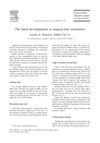 63 citations,
September 1987 in “Journal of Biological Chemistry”
63 citations,
September 1987 in “Journal of Biological Chemistry” Minoxidil slows fibroblast growth and collagen production, potentially treating keloids, hypertrophic scars, and connective tissue disorders.
4 citations,
March 2022 in “Journal of The American Academy of Dermatology” Finasteride use in young men with hair loss is linked to sexual dysfunction.
 1 citations,
May 2021 in “BMC Proceedings”
1 citations,
May 2021 in “BMC Proceedings” The document concludes that more research is needed to reduce frequent hospital visits, addiction medicine education improves with specific training, early breast cancer surgery findings are emerging, nipple smears are not very accurate, surgery for older melanoma patients doesn't extend life, a genetic condition in infants can often be treated with one drug, doctors are inconsistent with blood clot medication, a certain gene may protect against cell damage, muscle gene overexpression affects many other genes, and some mitochondrial genes are less active in mice with tumors.
 16 citations,
March 2007 in “The Veterinary clinics of North America. Food animal practice”
16 citations,
March 2007 in “The Veterinary clinics of North America. Food animal practice” Proper mineral supplementation in cow-calf operations prevents health issues and economic losses.
 1 citations,
June 2019 in “Food Research”
1 citations,
June 2019 in “Food Research” Tempeh oil rich in linoleic acid may protect against skin aging caused by UV light.
January 2019 in “Journal of Dermatology and Dermatologic Surgery” Wearing headcovers doesn't affect male-pattern hair loss severity.
 19 citations,
May 2005 in “Archives of Environmental & Occupational Health”
19 citations,
May 2005 in “Archives of Environmental & Occupational Health” All immigrant workers in the study had skin problems, with fungal nail infections, athlete's foot, and acne or folliculitis being most common, affecting their quality of life, yet they didn't seek medical help.
 18 citations,
May 2016 in “Aesthetic Surgery Journal”
18 citations,
May 2016 in “Aesthetic Surgery Journal” Body hair transplantation is an effective method for restoring hair in people with severe baldness and limited scalp donor hair.
 2 citations,
November 2022 in “Frontiers in Pharmacology”
2 citations,
November 2022 in “Frontiers in Pharmacology” Local healers in Addis Ababa use 81 medicinal plants, mainly from the Asteraceae family, to treat skin and general diseases, with Echinops kebericho being an endangered plant important in their practices.
 November 2022 in “Arab Gulf Journal of Scientific Research”
November 2022 in “Arab Gulf Journal of Scientific Research” Taurine is important for many body functions and its deficiency can cause health problems.
 May 2023 in “Journal of The American Academy of Dermatology”
May 2023 in “Journal of The American Academy of Dermatology” The document's conclusion cannot be provided because the document is not available to parse.
 6 citations,
May 2004 in “Facial Plastic Surgery Clinics of North America”
6 citations,
May 2004 in “Facial Plastic Surgery Clinics of North America” By 2004, Follicular Unit Transplantation (FUT) was the most effective method for surgical hair restoration, while the newer Follicular Unit Extraction (FUE) had more disadvantages and was less recommended.
 1 citations,
November 1994 in “JAMA”
1 citations,
November 1994 in “JAMA” The document praises a resource on hair growth disorders and recognizes a reference on blood diseases' molecular aspects as authoritative.
 108 citations,
July 2002 in “Molecular and cellular biology”
108 citations,
July 2002 in “Molecular and cellular biology” Overexpressing Dsg3 in mice skin causes excessive cell growth and abnormal skin development.
 62 citations,
February 2016 in “ACS Applied Materials & Interfaces”
62 citations,
February 2016 in “ACS Applied Materials & Interfaces” Technique creates 3D cell spheroids for hair-follicle regeneration.
 43 citations,
January 2011 in “Plastic and Reconstructive Surgery”
43 citations,
January 2011 in “Plastic and Reconstructive Surgery” Stem cells have great potential for improving wound healing, but more research is needed to find the best types and ways to use them.
 15 citations,
January 2019 in “Gynecological Endocrinology”
15 citations,
January 2019 in “Gynecological Endocrinology” The article concludes that global standardization in PCOS research is crucial for accurate diagnosis and understanding of the condition.
 53 citations,
December 2015 in “JAMA Dermatology”
53 citations,
December 2015 in “JAMA Dermatology” Women with PCOS often have more body hair, acne, and skin darkening, and these signs are linked to metabolic issues like insulin resistance and high cholesterol.
 16 citations,
October 2015 in “Photochemistry and photobiology”
16 citations,
October 2015 in “Photochemistry and photobiology” Reducing copper (II) ion levels in hair can decrease hair damage.
July 2016 in “Biometrics & Biostatistics International Journal” New guidelines using video aim to ensure honest reporting of hair loss treatments.
 22 citations,
October 2018 in “Aesthetic Plastic Surgery”
22 citations,
October 2018 in “Aesthetic Plastic Surgery” Understanding hair follicle biology and stem cell control could lead to new hair loss treatments.
 989 citations,
August 2007 in “The Lancet”
989 citations,
August 2007 in “The Lancet” PCOS is a complex condition with major health impacts, needing more research for better diagnosis and treatment.
 60 citations,
April 2012 in “Physiology”
60 citations,
April 2012 in “Physiology” The document concludes that understanding hair and feather regeneration can help develop new regenerative medicine strategies.
 14 citations,
July 2001 in “American Journal of Human Genetics”
14 citations,
July 2001 in “American Journal of Human Genetics” Haplogroup X found in Altaian population supports Amerindian origin.
 2 citations,
September 2022 in “Cytotherapy”
2 citations,
September 2022 in “Cytotherapy” Fat-derived stem cells show promise for treating skin issues and improving wound healing, but more research is needed to confirm the best way to use them.
 38 citations,
July 2021 in “ACS Nano”
38 citations,
July 2021 in “ACS Nano” Microneedles help treat hair loss by improving hair surroundings and promoting growth.
 18 citations,
November 2014 in “Journal of Agricultural and Food Chemistry”
18 citations,
November 2014 in “Journal of Agricultural and Food Chemistry” Brazilian propolis was found to speed up hair growth in mice by increasing the growth of skin cells that form hair.
 1 citations,
October 2022 in “Adolescent Health, Medicine and Therapeutics”
1 citations,
October 2022 in “Adolescent Health, Medicine and Therapeutics” Gender-affirming therapy can cause skin issues like acne and hair loss in transgender adolescents, and more research is needed on its dermatological effects.
 32 citations,
July 2011 in “Facial Plastic Surgery”
32 citations,
July 2011 in “Facial Plastic Surgery” New hair transplant methods offer more natural results and better graft survival, with ongoing research to increase donor hair options.
 August 2024 in “Indian Journal of Skin Allergy”
August 2024 in “Indian Journal of Skin Allergy” Stem-cell therapy shows promise for skin conditions but needs more research.



























